News for 23 April 2021
All the news for Friday 23 April 2021
Malaysia lose all their hockey matches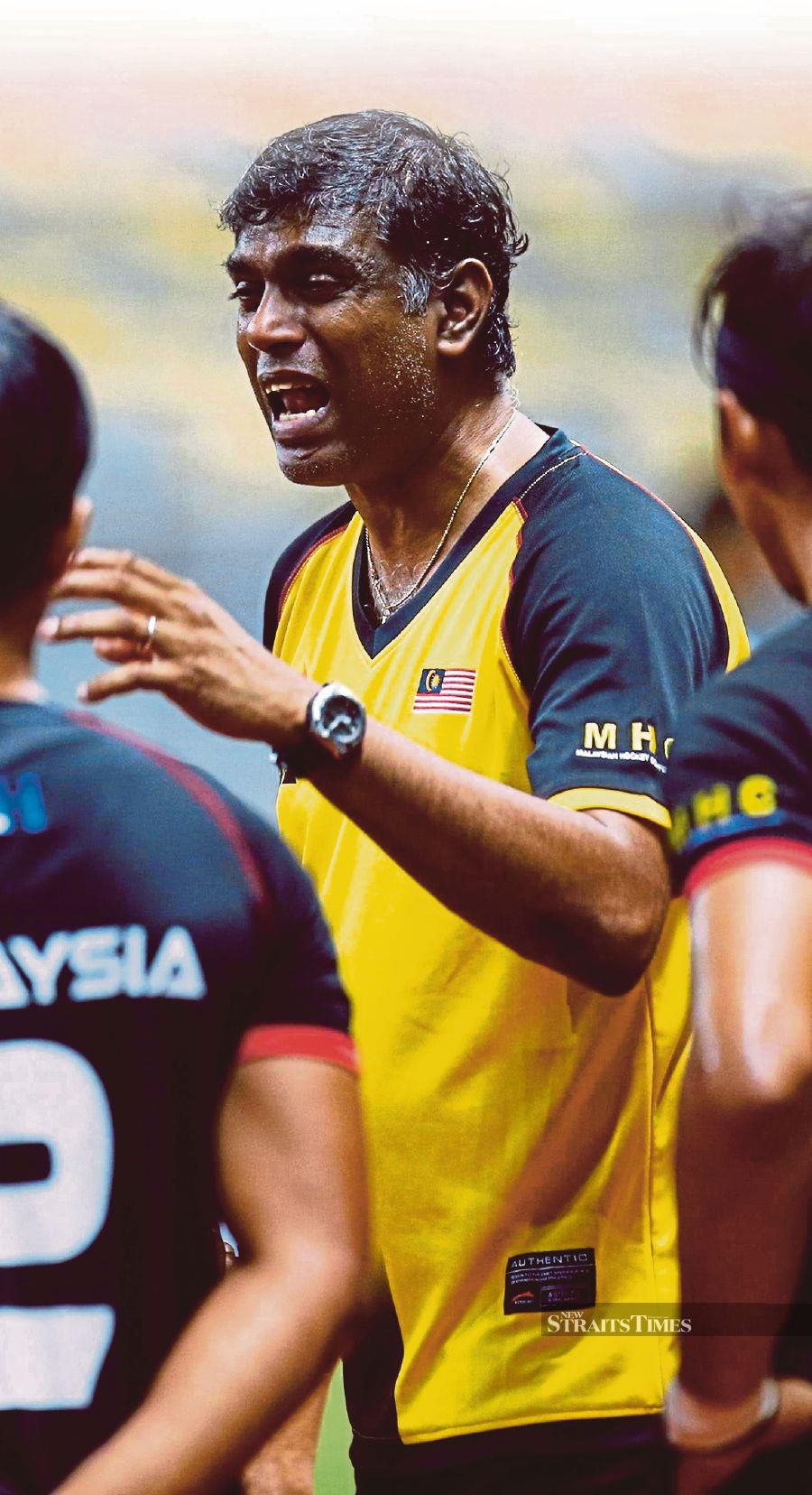
Malaysia coach Arul Selvaraj
KUALA LUMPUR: There was no face-saving match for Malaysia. Arul Selvaraj's team, lost it, even the last one today - against Great Britain.
Malaysia got beaten 1-0 by Britain, making a 100 per cent losing record in the friendly triangular at the National Hockey Stadium in Bukit Jalil.
The national men's hockey team, despite having home ground advantge, lost all their four matches in the friendly series.
A single strike from Liam Ansell, off a 17th minute penalty corner, was enough for Britain to emerge winners.
In earlier matches, Britain had beaten Malaysia 3-1 while Japan won 3-0 and 1-0.
Malaysia let in eight goals in four matches, and scored only once, off a Razie Rahim penalty corner.
New Straits Times
Samurais proving to be strongest
By Hazira Ahmad Zaidi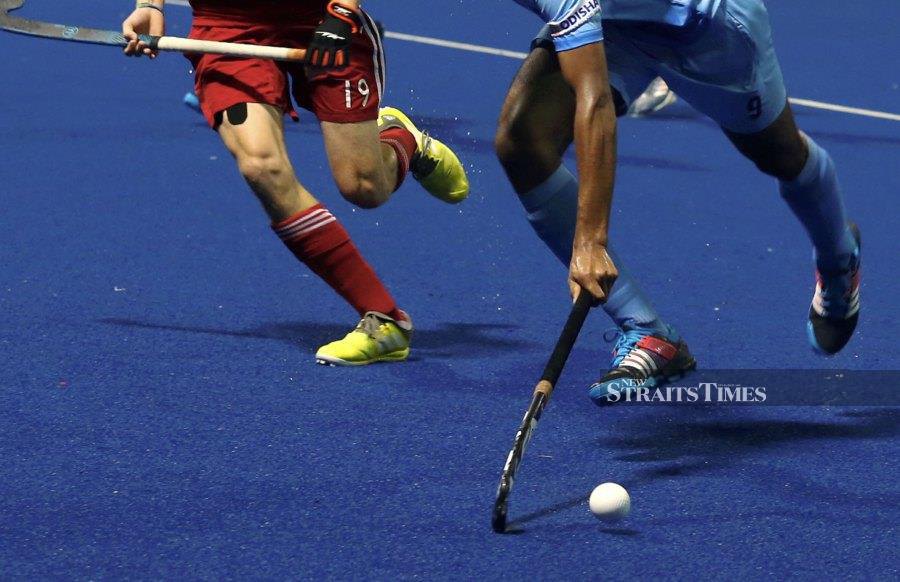
- NSTP File Pix
What happens when two teams, who have beaten Malaysia in a friendly triangular, clash?
Japan turned out to be the strongest as they overpowered Great Britain 3-1 on Wednesday at the National Hockey Stadium in Bukit Jalil.
In their earlier encounter, World No 15 Japan held Britain to a 2-2 draw.
Great Britain, themselves, have no world ranking while England are ranked No 7 in the world.
Japan were on the offensive from the start with Kentaro Fukuda and Ryosei Kato leading the frontline but they just could not get a clear shot as the British defenders stood solidly infront of their goalkeeper.
However, the elusive goal finally arrived in the 34th minute when Hirotaka Zendata converted a penalty corner.
But in the 52nd minute, Briton Ian Sloan finished off from close range to level the score.
Zendata was the toast of Japan when he put them back in the lead off a 54th minute penalty corner. Barely a minute later, the Samurais smashed home a third goal through Kato.
Japan and Great Britain, who are both preparing for the Tokyo Olympics, will wrap up their tour with an extra match on April 24 in Malaysia.
New Straits Times
Shipperley Grateful For Malaysia Tour Opportunity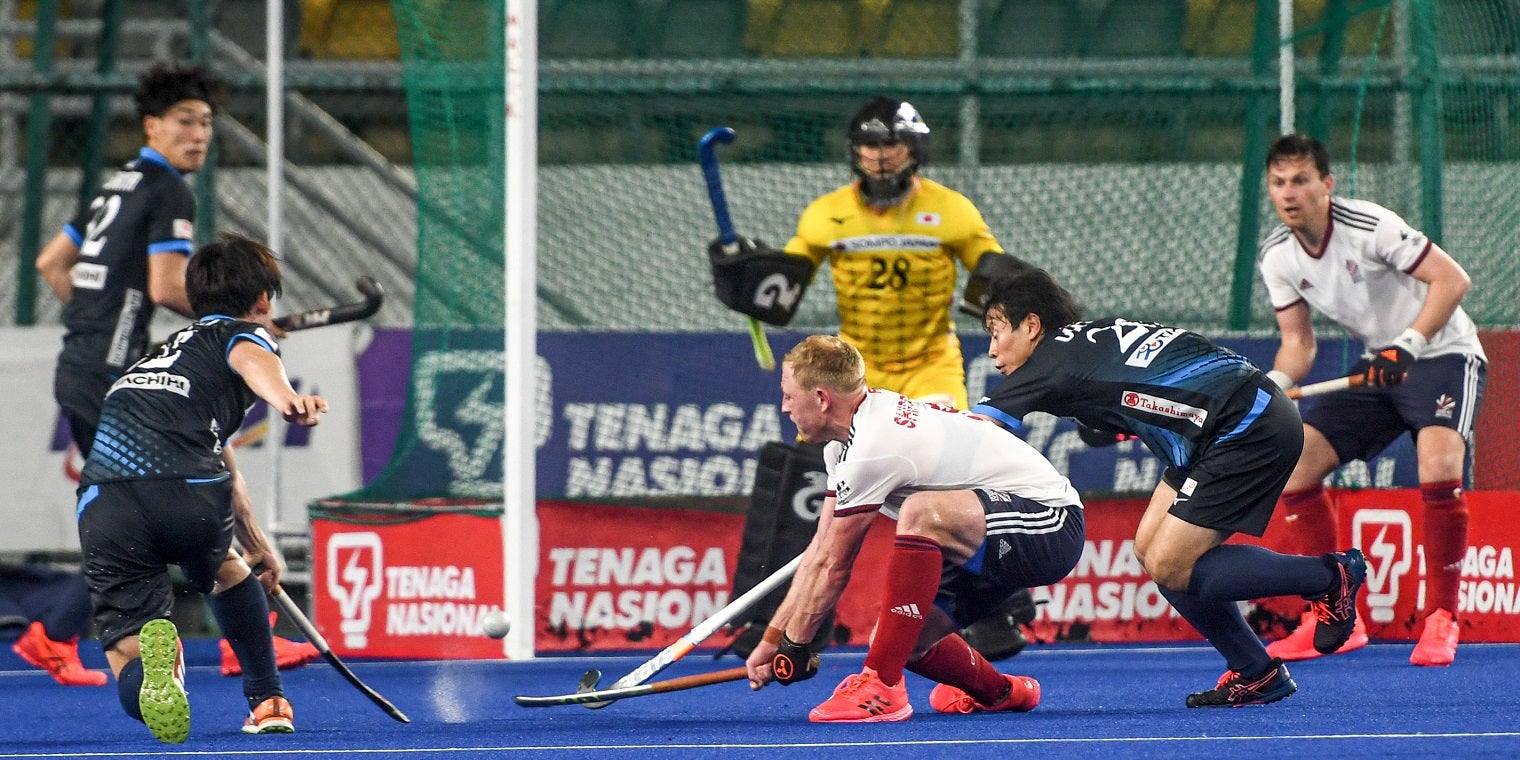
When Great Britain’s men landed in Malaysia just over a week ago, it signalled the start of an increasing intensity in preparations for the Tokyo Olympics.
The team had to spend a week in quarantine before commencing practice matches against Malaysia and Japan, scheduled to be played from 18 April to 24 April, which form an important part in their preparations for the summer’s Games.
Having already contested several matches, Rupert Shipperley reflected on the tour so far:
“It’s been different to normal trips that we’ve had. The quarantine period was something that we had to get used to, but we dealt with it well and it’s been good to get some games going, which everyone has really appreciated. A lot of work has gone into making them happen and it’s just nice to be playing some hockey matches again.
“My quarantine period was very different to some of the others. I took a putting mat, so I hit a lot of golf putts. I needed to work on my putting, but I think I’ve hit too many now, I’m trying to get to that 10,000 hours to have mastered something and I can’t be far off now!
“I also brought along the Playstation, I drank a lot of tea and listened to lots of podcasts. I’d love to say I’ve been listening to a really educational podcast but I’m a big fan of Tailenders with Greg James and then The Peter Crouch podcast, those are the two which I’ve been really cracking on with as they’re a bit light-hearted and kept me going through the day.
“Hockey-wise, I think we’ve been preparing really well. The team are all working hard to make sure we’re in the best shape, we’re doing lots of heat chamber work and are looking at nutritional strategies and the best way to cope with the heat.
“We’ve been very fortunate to keep training through the recent lockdown so we’re very well prepared. We’d all love to play a few more games but I think we’re in good stead at this moment.
“I’ve never actually played Japan before, so it was a first for me. They were very well organised and worked hard, they obviously had a game plan. It was our first match out here in the heat and we played really well in parts but had a lot of learnings to take from it. It was nice to also get a win against Malaysia in our match against them too.
“Playing international hockey again at the moment is a bit of gold dust and we’re really appreciative of the hard work that’s gone into a trip like this to get some more games and see the conditions of what Tokyo will be like.”
Following on from the Malaysia trip, the team have the FIH Hockey Pro League resumption firmly on the horizon with matches against Germany (12 and 13 May) and Spain (22 and 23 May) next in sight.
Having first appeared for Great Britain on 1 February 2020 when the team travelled to face Australia and New Zealand, Shipperley could make his GB home debut this May and offered his thoughts on the upcoming matches:
“I’m excited for the home matches in May, the Pro League is really good, although it’s a shame there isn’t going to be a packed-out Lee Valley but playing at home will be a nice treat and will give us some more games against quality opposition.
“It will be a weird one, I haven’t really thought too much about my first home game for GB. It’s been a while now from being called up into the programme and not having had that opportunity to play at home, but it will be a special moment.
“It’s a shame that it can’t be shared with family and friends, but that’s the times we’re in and we’re fortunate that we’re able to play these matches in the first place.”
https://assets-eu-01.kc-usercontent.com/cb3ef1c8-df8c-01cb-c932-3d4740102b9a/6af8ad58-14c9-49b7-b62a-55498109b066/MHC0.jpg?auto=format&w=760&q=85
Having recently surpassed the 100 days to go mark, the Tokyo Olympics is rapidly approaching. With the prospect of potentially making his maiden Olympic appearance, and being the first Welsh athlete to play for GB Hockey at the Games since Sarah Thomas at London 2012, Shipperley revealed his thoughts ahead of the tournament:
“The excitement for the Olympics is still there but there’s lots of hard work still to be done and everything we’re doing now is in the build-up for the Games. But we’ve still got the Pro League games in May and the Euros before that as well, so there’s still lots of hockey to be played in what isn’t really a very long period of time.
“Obviously, it would be massive to be able to play at the Olympics. It’s something I’ve always wanted to do and have been working towards for quite a while, to be in the situation where it might be possible really makes the nerves kick in a bit. It would be a massive achievement. Hopefully, I can make myself, friends and family proud, it really would mean a lot to be selected.
“Hopefully it won’t just be me there from a Welsh perspective as we’ve also got Jacob Draper, Sarah Jones and Leah Wilkinson across the two teams, so if all four of us can go then that would make a really nice bit of history for Hockey Wales. It just shows the hard work and good direction Hockey Wales is going in and I think it would be a real credit to them if we do have some Welsh athletes in the GB Hockey team at the Olympics.”
Great Britain Hockey media release
IOC Athletes' Commission recommend keeping podium protest ban but call for clarity on sanctions
Liam Morgan, Inside the Games
The International Olympic Committee (IOC) Athletes' Commission has recommended maintaining the ban on podium protests at the Olympic Games, but called for a "restructuring" of Rule 50 and greater clarity on sanctions for breaches.
A report from the Commission - obtained by insidethegames - makes six recommendations following an 11-month consultation on Rule 50, which prohibits athletes from demonstrating or protesting in certain places at the Games.
They were all unanimously approved by the IOC Executive Board during its virtual meeting today.
The IOC had come under pressure to relax the rule in the wake of global anti-racism protests triggered by the death of George Floyd, an unarmed black man, at the hands of white police officer Derek Chauvin in the United States last May.
The IOC Athletes' Commission report suggests changes could be made in time for this year's postponed Tokyo 2020 Olympics, but the recommendations stop short of proposing the abolition of the rule that some countries have called for.
According to the findings of the survey held as part of the consultation, 70 per cent of the 3,547 respondents, who spanned 185 countries and all 41 Olympic sports, said the field of play and official ceremonies were not an appropriate place for competitors to demonstrate or protest.
Over two thirds - 67 per cent - held the same view when it came to the podium.
The majority of responses from Athlete Commissions who participated in a qualitative consultation with the IOC Athletes' Commission also signalled their opposition to athletes being allowed to protest on the podium, field of play or official ceremonies, the report said.
The IOC Athletes' Commission recommended to "preserve the podium, field of play and official ceremonies from any kind of protests or demonstrations, or any acts perceived as such".
The report from the IOC Athletes' Commission makes six main recommendations to the Executive Board ©ITG
The report notes how some athlete representatives used freedom of speech as the basis for their belief that they should be able to protest anywhere at the Games.
In the document, the IOC Athletes' Commission claimed it took this view into account but said freedom of speech "is not absolute" and "may be limited" under certain restrictions, which it said covers the Olympic Games, after consulting with human rights experts.
The report suggested the IOC "increase opportunities for athletes expression during the Games", including having a "moment of solidarity against discrimination" at the Opening Ceremony, which 48 per cent of survey respondents rated as "important".
Athletes could be allowed to wear kit and apparel featuring the words peace, respect, solidarity, inclusion and equality under the wider scope they are set to be given to express themselves at the Olympics.
Adapting the oath athletes recite at the Opening Ceremony to include messaging on inclusion and non-discrimination, increased opportunities outside of the Games, and increased social media campaigns were among the other recommendations.
The survey also sought opinions on physical gestures at Olympic venues, creating a specific area for demonstrations at the Olympic Village and wearing clothing or armbands with personal or collective messages.
The results showed "displaying a message on an armband/tattoo/badge/clothing that promotes the Olympic values" was the most appropriate option among those put forward.
While much of the findings were to be expected, the IOC Athletes' Commission did call for further clarity on the sanctions that could be handed down to athletes who protest in restricted areas at future Olympics.
The Commission itself devised Rule 50 guidelines in January of last year, which threated athletes with possible disciplinary action, and it is not clear whether they could be changed prior to Tokyo 2020.
"The IOC Athletes' Commission recommends that the Legal Affairs Commission clarify, in due course, the range of sanctions that would be imposed for a breach of the rule, taking into consideration the respective context of each individual case," the report states.
The United States Olympic and Paralympic Committee has said it will not punish athletes for demonstrations such as kneeling or raising a fist.
Several of the Athletes' Commissions who responded to the consultation called for clarification on what exactly defines a protest or a demonstration, an issue the report also acknowledged.
"Although the restriction imposed by Rule 50 may appear too sweeping, especially if compared to some sports organisations which allow expression in support of social (as opposed to political) causes, there are significant difficulties that an organisation as diverse and universal as the IOC would face in distinguishing between admissible and inadmissible causes," the report states.
"For this reason, a blanket policy of neutrality is deemed an appropriate and proportionate solution, including from a human rights perspective, given the risk of politicising the IOC and alienating countries or athletes.
"Rule 50 does not aim to silence athletes or make them apolitical...rather it is to keep the Olympic Games politically neutral."
The report also recommends the IOC separate the two different regulations which make up Rule 50.
Rule 50.2 states that "no kind of demonstration or political, religious or racial propaganda is permitted in any Olympic sites, venues or other areas", while 50.1 states: "Except as may be authorised by the IOC Executive Board on an exceptional basis, no form of advertising or other publicity shall be allowed in and above the stadia, venues and other competition areas which are considered as part of the Olympic sites.
"Commercial installations and advertising signs shall not be allowed in the stadia, venues or other sports grounds."
Several Athletes Commissions in the qualitative consultation admitted some of its members did not fully understand Rule 50.
"The combination of Rule 50.1 and 50.2 in Rule 50 leads to a lack of clarity on the scope and purpose of Rule 50," the report states.
The IOC Athletes' Commission wants "more clarity on the scope of 50.2, including by incorporating some elements that are currently included only in the Rule 50 guidelines, into the rule itself".
Pan American Hockey Federation media release
Indoor hockey season finale
by Helge Schütz
Maggy Mengo in action for DTS against Saints. Photo: Helge Schütz
THE Bank Windhoek Indoor Hockey league in Namibia reaches its climax this weekend when the semifinals and finals are held at the DTS and WAP courts in Windhoek over the weekend.
Saints have dominated the Premier League in recent years with both their men and women having won the title for the past three years, but several upcoming clubs will be keen to test their credentials against the champions.
In the Men's Premier League, Saints have been in great form, going through the season unbeaten, while scoring 66 goals and conceding only 11 in six matches.
They have a star-studded side, having contributed eight of the 12 players who represented Namibia at last weekend's Africa Cup, and with most of them available, they will be tough to beat.
They include their 18-year-old striker Fagan Hansen who won the top striker award at the Africa Cup with an astounding 24 goals in five matches, including putting 11 goals past the hapless Batswanas in both their encounters.
Fagan's brother Dakota also had a great tournament, while their other nationals, Richter van Rooyen and Owen Hatton should be available.
Johannesburg-based Brynn Cleak is also available, although Liam Hermanus and Nico Neethling have returned to South Africa to study.
In tomorrow's semifinals, Saints take on the School of Excellence Hockey Club (SoEHC), who have made a fine start in their debut season in the Premier League by finishing fourth on the log.
They have some fine young players coming up, including the Handura brothers Giovanni and Delron, but Saints will start the match as firm favourites after posting a resounding 13-2 victory in their league encounter in March.
The other semifinal between Windhoek Old Boys and DTS should be a closer affair, which could go either way.
Old Boys won their league encounter 8-3 in February, when Ernest Jacobs scored five goals and the veteran Siyabonga Martins two, but a full-strength DTS side will provide a stiff challenge for Old Boys.
They had three players at the Africa Cup in captain DJ Strauss and the Britz brothers, David and JP, and with others like Josh van der Merwe, Percy Barthram and Ivan Semedo making an impact this season, they will fancy their chances.
Old Boys only had one national player in Durban in Ernest Jacobs, but they have a strong side with other experienced players like Siyabonga Martins, Bucko Bartlett, Nico Jacobs, Dylan Finch and Willie Serfontein in their midst.
The semifinals take place at the DTS hall tomorrow, with Old Boys playing DTS at 15h00 and Saints against SoE at 16h00. The final takes place at 13h00 on Sunday.
In the women's semis, Saints take on Wanderers, while DTS play Old Boys.
Saints' women have also gone through the season unbeaten, scoring 40 goals and conceding eight in six matches, and they should be close to full strength with returning national players like Gillian Hermanus, Azaylee Philander, Sunelle Ludwig and Danja Meyer, although Dure Boshoff and Tara Myburgh have returned to South Africa to study.
In their league match in February, Saints thumped Wanderers 14-0 and they will start as the overwhelming favourites.
The other semi between DTS and Old Boys will be a closer call, although DTS won their league encounter 1-0 in February, with inspirational captain Maggy Mengo scoring the winning goal.
Goal keeper Petro Stoffberg, who won the player of the tournament award in Durban, will also bolster their ranks, while others like Cele Wessels, Anthea Coetzee and Anine le Roux have all been in fine form this season.
Old Boys have two nationals returning in Jivanka Kruger and Kaela Schimming and with other experienced players like Marcia Venter, Armin van Staden and Phia Gerber they will field a strong side.
DTS play Old Boys in the first semi at 13h00, to be followed by Saints against Wanderers at 14h00. The final is scheduled for 12h00 on Sunday.
The semifinals and finals of the men and women's Reserve Premier League and First Leagues will also take place this weekend.
The Namibian
Fifty years ago – when Kenya made it to the semi-finals of Barcelona World Cup
by Dil Bahra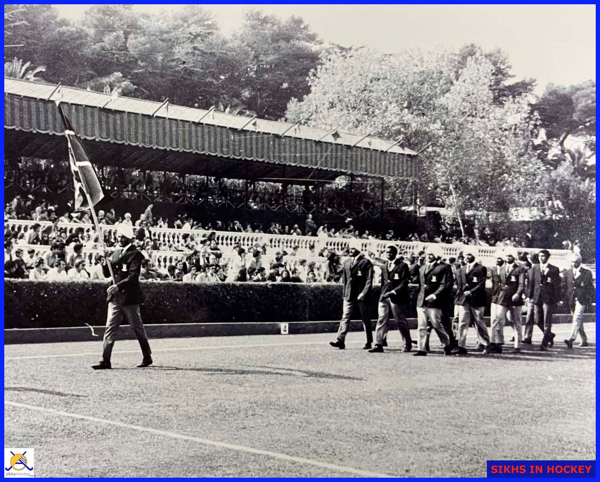
Kenya’s Captain Avtar Singh Sohal leading his team at the opening ceremony of the first World Cup
in Barcelona in 1971. Photo: Avtar Singh Sohal collection.
The idea of holding a Hockey World Cup had come from India and Pakistan, then the two dominant nations in international hockey, in early 1969.
At the council meeting of International Hockey Federation (F.I.H.) in Brussels on 11/12 April 1970, Pakistan was confirmed as hosts for a 10-team tournament to be held in Lahore in February 1971.
The four top finishers in the inaugural European Cup would be joined by the top three from the 1970 Asian Games. Kenya and Argentina were selected on recent results to represent their respective continents, while Australia and New Zealand contested the one spot for Oceania.
The ten teams in the World Cup were divided into two pools of five as follows:
|
Pool A |
Pool B |
|
Europe 1st – WEST GERMANY |
Europe 2nd - HOLLAND |
|
Europe 4th - FRANCE |
Europe 3rd - SPAIN |
|
Asia 2nd - INDIA |
Asia 1st - PAKISTAN |
|
Africa 1st - KENYA |
Australasia 1st - AUSTRALIA |
|
America 1st - ARGENTINA |
Asia 3rd - JAPAN |
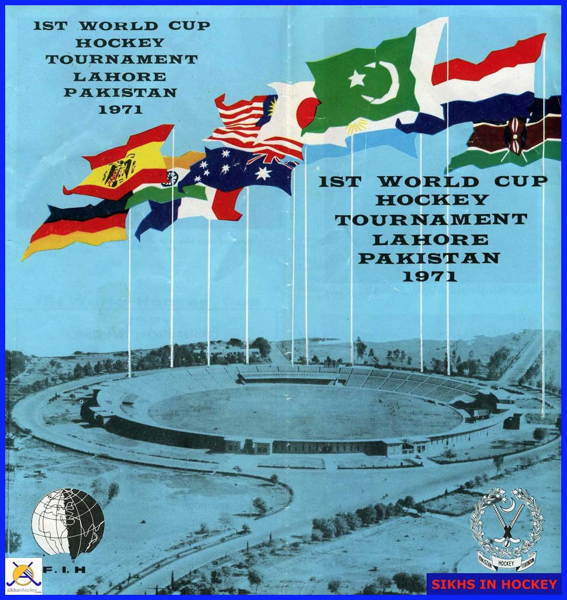
The 1st World Cup was originally scheduled to be played in Lahore, Pakistan. Photo: Dil Bahra / Sikhs in Hockey
According to the Tournament Rules, each team would play the others in their pool (on a league basis) and the nations finishing in the first place would compete against that finishing second in the opposite pool in the semi-finals.
F. I. H. agreed to implement the experimental rule of substitution of players as follows:
a. replacement of the goalkeeper may be made at any time;
b. replacement of one field player may be made within the first 50 minutes of a game;
c. a player may be replaced for any reason (though naturally once he has left the field, he may not return);
d. no suspended player may be replaced.
The number of players will be limited to 16 plus one official (and one umpire if selected by the F.I.H.).
Selected countries must ratify their agreement to participate by November 30th, 1970, by notifying the host country and the F.I.H.
The first Hockey World Cup on grass, which was to have taken place in Lahore in February 1971, was postponed because of fears that the competition would take place in "an atmosphere of violence". The postponement came little more than a fortnight before it was due to begin.
It was eventually held at the Royal Polo Club in Barcelona, Spain in October 1971.
The Kenya Squad (in shirt number order), which was selected shortly after the team won the East and Central African Championship held in Lusaka, Zambia, in August 1971, was:
|
1 |
Amarjeet Singh Marwa (G/K) |
Rangers Hockey Club Nakuru |
|
2 |
Surjeet Singh Panesar |
Sikh Union Club Nairobi |
|
3 |
Avtar Singh Sohal (captain) |
Sikh Union Club Nairobi |
|
4 |
Santokh Singh Matharu |
Railway Gymkhana Club Nairobi |
|
5 |
Surjit Singh Rihal |
Sikh Union Club Nairobi |
|
6 |
Resham Singh Bains |
Sikh Union Club Nairobi |
|
7 |
Leo Fernandes |
Goan Institute Nairobi |
|
8 |
Jagjit Singh Kular |
Sikh Union Club Nairobi |
|
9 |
Davinder Singh Deegan |
Sikh Union Club Nairobi |
|
10 |
Ravinder Singh Laly |
Sikh Union Club Nairobi |
|
11 |
Tarlochan Singh Channa |
Sikh Union Club Nairobi |
|
12 |
Shabir Bhatti (G/K) |
Railway Gymkhana Club Nairobi |
|
13 |
Jagmel Singh Rooprai |
Railway Gymkhana Club Nairobi |
|
14 |
Harvinder Singh Marwa |
Rangers Hockey Club Nakuru |
|
15 |
Saggia Hezron |
Wanainchi Hockey Club Nairobi |
|
16 |
Brajinder Daved |
Railway Gymkhana Club Nairobi |
The team departed Nairobi for Barcelona on 2nd October 1971 and stopped over in Athens, Greece for one day.
The next stopover was Rome, Italy where Kenya played one match against Italy on 6 October 1971. President of Italian Hockey Commission, Mr Antoni Triglia and India’s Olympian, Inder Singh, who emigrated to Italy after Mexico City 1968 Olympic Games, met the teams before the start of the match.
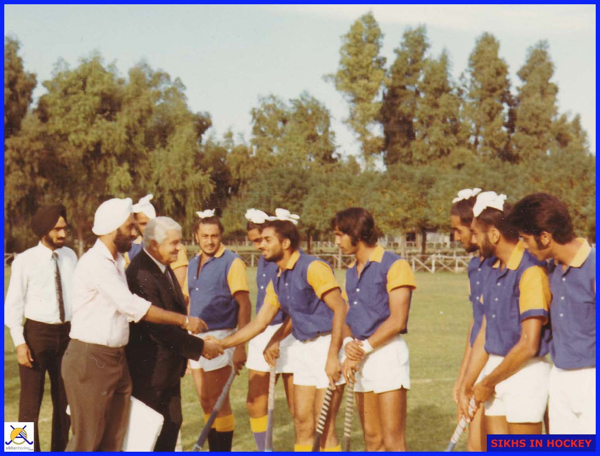
President of Italian Hockey Commission, Mr Antoni Triglia being introduced to the Kenya team by Team Coach Hardev Singh before the start of the Italy v Kenya match. Extreme left is Indian Olympian Inder Singh. Photo: Surjit Singh Rihal Collection
Kenya started their tour a little disappointingly, managing only a 2 – 2 draw. Avtar Singh Sohal, the captain, twice gave Kenya the lead at penalty corners but each time ‘Kiki’ Aramu equalised.
The visit to Rome brought happy memories to two of Kenya’s players. Avtar Sohal, recalls “For Surjeet Junior and me, this is where we played our first Olympic in 1960. The following day the team visited the Olympic Velodrome which was a great inspiration for the younger members of our team before the World Cup” 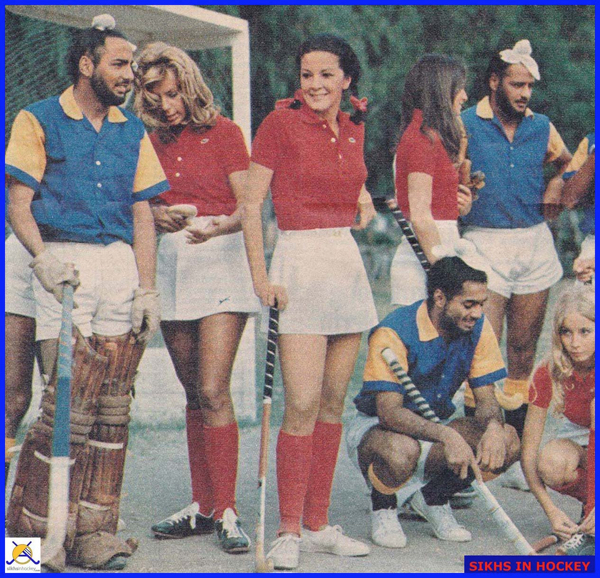
After the match some Kenya players met the world famous Italian American Soprano Anna Moffo, called “the beautiful” (third from left) who was invited to the match as a guest by Antonio Trigia. Photo: Dil Bahra / Sikhs in Hockey.
Kenya then moved on to Amsterdam where they beat Holland, Europe’s No 2 Nation, 2 – 1, with Ravinder Singh Laly scoring both the Kenya goals. It was a good match marred by an eye injury to van Staveren which put the Dutch captain out of the World Cup.
The team reached Barcelona on Sunday 10th October 1971.
Surjit Rihal recalls “I felt like as if l was back at Lyallpur Khalsa College Jalandhar after the holidays when l met the Indian Team at the hotel. A few of them were my classmates at the college about two years ago, with some of them l had played for Punjab University and Combined Universities and with most of the rest l had played at the Indian National Training Camp at Jalandhar.”
He added “Here in Barcelona our teams went for training at different times and l used to meet my friends from India at dinner times to talk about college friends and chat about the college days.”
The team practiced on the pitches at the grounds of the Pablo Negre summer house in Can Salvi, just outside Barcelona, which had three purpose built hockey pitches. They lost 1 – 0 to the Spanish team in a friendly match before the tournament started.
Day 1 – Friday 15 October 1971.
Kenya was drawn in Group ‘A’ together with Argentina; France; India and West Germany.
The very first World Cup match began at 10 in the morning of Friday, October 15. Europe’s No 1 team, West Germany, beat America’s No 1 team, Argentina, 5 - 1.
India defeated France 1 – 0, Harmik Singh scoring the only goal of the match from a penalty corner in the 43rd minute, in the other match of Pool A.
In Pool B, Spain defeated Japan 2 – 0 and Pakistan defeated Australia 5 – 2.
Four matches were played each day. Kenya and Holland had a rest day.
Day 2 – Saturday 16 October 1971.
Kenya’s first match of the World Cup was the first game of the day starting at 9 in the morning against France, who had lost to India the day before.
Kenya and France had played four matches previously, Kenya winning one, drawing one and losing twice. Kenya had lost their last encounter against France 1 – 2 at the 8 Nations Tournament in Lahore, Pakistan in March 1969.
France started very strongly, spearheaded by their brilliant inside-left Georges Grain, upsetting the Kenya pattern of play with fierce hard thrusts and determined re-tackling. France took the lead in the 27th minute through a well struck George Grain goal to give his team a 1 – 0 half time lead.
Kenya started well in the second half and made several attacks on the French goal. But the French lived up to their reputation of having the finest defence in Europe and kept out the Kenyans.
In between the second and third match of the day, the opening ceremony was held.
The last match of the day, at 1535 hrs was India v Argentina. India won with a goal by centre forward Rajwinder Singh in the 54th minute.
In Pool B matches, Spain and Holland drew 0 – 0 and Pakistan defeated Japan 1 – 0.
Day 3 – Sunday 17 October 1971.
West Germany beat France 4 – 0 in the first match of the day.
Kenya’s second match was against India. India had played and won both their previous matches and a win for them in this match would qualify them for a semi-final place.
Kenya and India had played twenty eight times before, both at home and away since their first match in Nairobi in January 1948. Kenya’s captain, Avtar Singh Sohal, had recorded more wins against India than any other country. This included India’s heaviest defeat at home in 1964 when Kenya defeated India 3 – 0 in Jabalpur. Both teams played a similar style of attacking hockey and knew each other well.
Surjit Rihal recalls “During the warm up before the game, seeing the Indian team in the other half of the ground, reminded me of the times in India playing with and against them. Just before the start of the game when we were waiting for the whistle, many thoughts came to my mind. At Lyallpur Khalsa College, l used to play Left Half along with Ajitpal as Centre Half and Captain, l was the College Captain in the final year. Now we were both playing Centre Half against each other. This was the first time for me to play against the Indian National Team in an International Tournament. I felt proud to see that my classmate, Ajitpal was now the Captain of the Indian Team. I was also facing my other College and University team mates from India. I had learnt the Indian way of scooping the moving ball from Ajitpal and l used it successfully against India in this match. We had a very competitive game but lost 0-2 late in the match.”
The India v Kenya match, at 12.45 pm was a good match with both teams playing attacking hockey. India, however, scored two goals in the last five minutes of the match. Kulwant Singh gave India the lead in the 65th minute when he followed a rebound from Kenyan goalkeeper, Amarjeet’s pads with a first time shot. A minute from the end, Vinood Kumar clinched the Indian win with a hard shot from a penalty corner hit.
Teams:
Kenya: Amarjeet Marwa, Surjeet Panesar, Avtar Sohal (capt), Santokh Matharu, Surjit Rihal, Resham Bains, Leo Fernandes, Jagjit Kular (Harvinder Marwa), Davinder Deegan, Ravinder Laly, Tarlochan Channa.
India: C Pereira, Vinod Kumar, Michael Kindo (Vece Paes), P Krishnamurthy, Ajitpal Singh (capt), Harmik Singh, M P Ganesh, Ashok Kumar, Rajwinder Singh, Kulwant Singh, Shahid Noor.
At the end of day 3, by defeating Kenya 2 – 0, India, coached by Balbir Singh Senior, qualified for semi-finals, with six points from three matches with a game to spare. Kenya remained without a win after two matches with only two pool matches remaining.
In Pool B, Pakistan and Holland drew 3 – 3 and Australia drew 1 – 1 with Japan.
Davinder Deegan recalls “after the loss to India, Hardial Singh Kular, (the coach of the Kenya team at Tokyo 1964 and Mexico 1968 Olympic Games) invited the team to his hotel. He used all his experiences to motivate us and had encouraging words with us to prepare for the next two games”.
Surjit Rihal recalls “The Indian Team was very happy with the performance of their team but our team was a bit depressed after losing the two opening matches. On the other table, our friends from West Germany, were telling us ‘Kenya go home, Kenya go home, you have no chance to progress’. The only way we would have a chance was if we win the next two games and West Germany lose their two remaining games. Our reply to them was ‘we have not lost to you as yet and we are going to win against you tomorrow’. Their words inspired us and made us more determined to play strong against them the next day”.
Brajinder Daved recalls “I remember distinctly the German team taunting us that the tournament was over for us and we ought to go home as we were playing Germany the next day”.
Avtar Sohal recalls “after the loss to India, during dinner time, everybody in our team were in pin-drop silence state and looked demoralised because next to our long dinner table were the Germany players were having their meals and were in very jovial and sarcastic mood cheering themselves with wine, indicating that they were going to thrash us in tomorrow's game. I requested our team to stay behind after the dinner and said good night to the officials. I took the team to the beach for a stroll to motivate them for the morning’s game against Germany. We discussed and planned our strategy and brought confidence in the team and they were in high spirits promised to go for the kill”.
Three Matches, in Three consecutive days with Three wins and a place into the semi-finals
Day 4 – Monday 18 October 1971.
Kenya, without a win, then played West Germany, Europe’s No 1 team and Olympic semi-finalists, who were one of the favourites to win the World Cup.
Kenya and West Germany had played against each other on five previous occasions, Kenya winning two, but losing three. Their last encounter was at the 8 Nations tournament in Lahore where Kenya lost 0 – 2.
West Germany who had won both their earlier pool matches, scoring nine goals, only needed a draw in their remaining two matches to qualify for the semi-finals.
Kenya on the other hand lost both their opening games and had not scored a goal in the tournament yet.
Kenya made a couple of technical changes to their forward line up for this crucial match. Jagjit Kular, who had limped off in the match against India the previous day, was fit again and he was moved to centre forward position. 17 years old, Brajinder Daved was called up to play as inside right with 19 years old Ravinder Laly playing as inside left.
Jagjit Kular, gave Kenya the lead in the 20th minute when he converted Leo Fernandes’ cross from the right wing. This settled Kenya’s nerves, taking them to a 1 – 0 lead at half time. Kenya’s captain Avtar Sohal increased the lead from a penalty corner in the 49th minute. In the dying minutes of the match, Davinder Deegan scored Kenya’s third goal.
Brajinder Daved, Kenya team’s youngest players, recalls when selected to play against Germany “it was my first ever trip to Europe – it felt like a dream coming true by playing in such a prestigious tournament”.
France defeated Argentina 1 – 0 in the other Pool A match.
In Pool B, Holland defeated Australia 1 – 0 and Spain defeated Pakistan 3 – 2.
Day 5 – Tuesday 19 October 1971.
At the start of Day 5, the last day of the Pool matches, only India from Pool A were the only team to have had already qualified for the semi-finals. France had played all their four matches and was on 4 points. Pakistan in Pool B had also played their four matches and was on 5 points.
In the first match of the day, at 10am in the morning, Holland, who were on 4 points from three matches, were favourites to beat Japan, who were bottom of their table. However, Japan won 1 – 0 with a Penalty corner goal by Toshiaki Ichinose in the 65th minute and knocked Holland out of a semi-final position. Holland’s loss meant that Pakistan were through to the semi-finals.
The second match of the day was Kenya’s last pool match was against Argentina, No 1 team from America. Kenya and Argentina had played only once before, at Mexico 1968 Olympic Games where Kenya won 2 – 1.
Kenya needed a win to have any chance of a place in the semi-finals. Ravinder Laly settled his team’s nerves with a goal in the 18th minute to give his team a 1 – 0 lead at half time. Tarlochan Channa increased the lead in the 62nd minute to give Kenya a comfortable win and then wait for the last match of the day, at 14.35 pm between India and West Germany.
In the third match, a Pool B match, Australia defeated Spain 1 - 0 with a penalty stroke goal by Don Smart in the 53rd minute. Spain had, however, qualified for the semi-finals following Holland’s loss in the first match of the day.
India defeated West Germany, who only needed a draw to qualify for the semi-finals, 1 – 0 through a Kulwant Singh goal in the 47th minute.
At the end of the day, West Germany, Kenya and France were all tied on 4 points each in Pool A. West Germany and Kenya, who had better goal-difference, had to play a play-off match for 2nd and third place in Pool A, on the rest day, to decide which team progressed to the semi-finals.
Davinder Deegan recalls “During dinner, after our win against Argentina, we celebrated Diwali. The Indian team were also celebrating. Our spirits were high and we were ready for the pool play-off match against Germany the following day.”
Avtar Sohal recalls “We tied on points with Germany and had to play them again for the semi-final. We assembled for dinner and requested our officials through our team doctor to allow our team to have a glass of wine each and we cheered loudly to show the Germany team that we were ready for them for the morning’s crucial game against them. The German team were sitting on the table next to ours. Our moral and spirits were very high leading to the morning’s match”.
Day 6 – Wednesday 20 October 1971.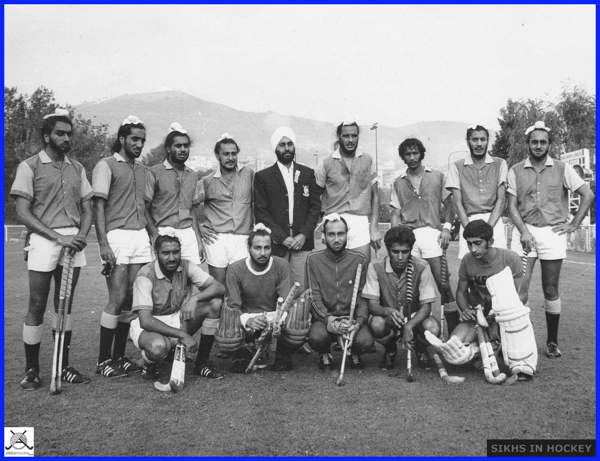
Kenya team after defeating West Germany in the pool play-off match. Photo: Avtar Singh Sohal collection
This was the second time in three years that Kenya was in a play-off match to decide which team progressed to the semi-final of a major tournament. At Mexico 1968 Olympic Games Kenya lost 2 – 3 to Australia in the Pool B play-off match.
The Kenya line-up included Surjeet Panesar, Harvinder Marwa, Leo Fernandes and Santokh Matharu who had played in the Mexico play-off match against Australia three years ago.
Kenya had a psychological advantage going into this play-off match having defeated West Germany 3 – 0 two days earlier in their pool match. In a tension packed match, Michael Peter gave the Germans the lead from a penalty stroke in the 38th minute. Two superb penalty corner strikes by Kenyan Captain Avtar Sohal within a space of three minutes (59 minutes & 62 minutes) put Kenya through to the semi-finals of the World Cup.
This was a remarkable achievement and comeback by Kenya, the East African champions after losing their opening two matches.
Brajinder Daved recalls “After winning the pool playoff match with Germany most of the senior payers were in tears and being so young I did not understand why – it transpired that they were tears of joy as we had just qualified for the semi final of the world cup!”
Kenya’s Minister for Co-operatives and Social Services, Musembi Mbathi, who is responsible for sports in the Republic of Kenya sent a telegram to the Kenya hockey team congratulating them on their success in the World Cup.
The telegram read: “The Government and people of Kenya are thrilled and proud to hear of your success on Kenyatta Day and entry into the semi-finals. Congratulations and wish you the best of luck”.
Day 7 – Thursday 21 October 1971.
Kenya had a Rest Day on Day 7, having played matches on 5 consecutive days (the only team to do so in the tournament). The match schedule was intense. Two classification matches were played in Tarrasa.
Day 8 – Friday 22 October 1971.
Both the semi-final matches were played in Tarrasa on Friday 22 October 1971, day 8 of the tournament.
Jagmel Rooprai recalls “the travelling time to the venue took us two and a half hours”
The first semi-final, India v Pakistan was played at 12.30pm. Rajwinder Singh gave India the lead at half time when he scored a goal in the 31st minute. Abdul Rashid equalised in the 39th minute and Munawar – uz – Zaman scored Pakistan’s winner from a penalty corner in the 57th minute.
The second semi-final, Spain v Kenya was played at 2.30pm in front of a crowd of 7,000.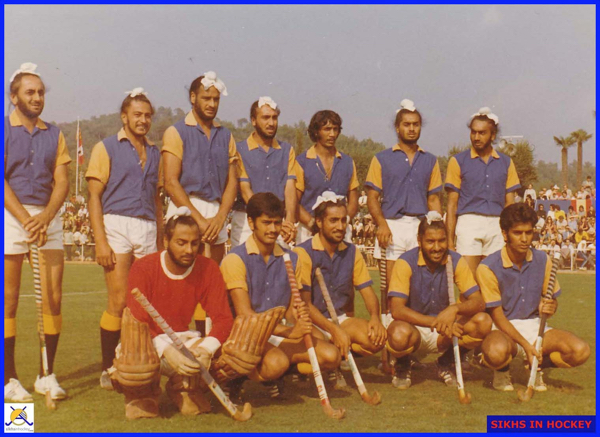
Kenya team that played against Spain in the semi-finals. Photo Surjit Singh Rihal collection
Kenya and Spain had played against each other on three previous occasions, Kenya winning one and losing two. At their last encounter, at Mexico 1968 Olympic Games, Spain beat Kenya 2 – 1.
The match went into extra time and Jorge Fabregas scored the Spanish winner in the last moments of extra time.
Brajinder Daved recalls “The semi-finals got moved to Terrassa which is in the hills and about 25 miles from Barcelona. The pitch had been watered to slow our team down as the Real Club de Polo pitches were fast and suited our style of play. We lost 1 - 0 to Spain in our semi-final and I felt devastated because we did not make it to the final”.
Day 9 – Saturday 23 October 1971.
Seventh match on day 9 was against India for the Bronze medal. Kenya had lost 0 – 2 to India in their Pool A match.
Rajwinder Singh gave India an early lead when he scored in the 14th minute. Kenya captain equalised in the second half from a penalty corner strike in the 58th minute taking the match into extra time. M P Ganesh scored India’s winning goal in the 89th minute.
Brajinder Daved recalls “In our bronze medal match with India my strike from a short corner rebound hit an Indian player on the goal line – we appealed for a penalty and were denied. Whilst we were appealing India started the game and went on to score the winning goal – devastated again. Luck and umpiring decisions did not go our way and we came away without a medal. So near yet so far has stayed with me ever since then”.
Teams:
Kenya: Amarjeet Marwa, Surjeet Panesar, Avtar Sohal (capt), Santokh Matharu, Surjit Rihal, Resham Bains, Davinder Deegan, Harvinder Marwa (Saggia Hezron), Jagjit Kular, Barjinder Daved, Ravinder Laly.
India: C Pereira, Baldev Singh, Vinod Kumar, P Krishnamurthy, Ajitpal Singh (capt), Harmik Singh, M P Ganesh, Ashok Kumar, Rajvinder Singh, Francis D’Mello, Harcharan Singh.
Day 10 – Sundy 24 October 1971.
Pakistan won the World Cup, defeating Spain 1-0 in the final.
The closing ceremony took place immediately after the final.
The Final standings were 1. Pakistan; 2. Spain; 3. India; 4. Kenya; 5. West Germany; 6. Holland; 7. France; 8. Australia; 9. Japan; 10. Argentina.
On the return journey home, the team stopped over in London. They played one match against Wales in Cardiff on Wednesday 27 October 1971, which they lost 0 – 1 and one match in Coventry at Coventry and North Warwick Club on Sunday 31 October 1971 and arrived back in Nairobi on 9th November 1971.
The win against Germany, twice in a space of three days, and a semi-final place in the World Cup is Kenya’s best position in a F.I.H. world event to date. Kenya played in one more World Cup, in Amsterdam in 1973 where they finished last (12th). Kenya is currently ranked 52nd in the F. I. H. World ranking list (13.04.2021).
Germany, on the other hand, went on to become Olympic Champions the following year at Munich. They followed this success with three more Olympic Golds (Barcelona 1992; Beijing 2008 and London 2012). Germany is currently ranked 3rd in the F. I. H. World ranking list.
Argentina, the only other team Kenya defeated in the pool match of the World Cup are the current Olympic Champions and ranked 6th in the F. I. H. World ranking list. 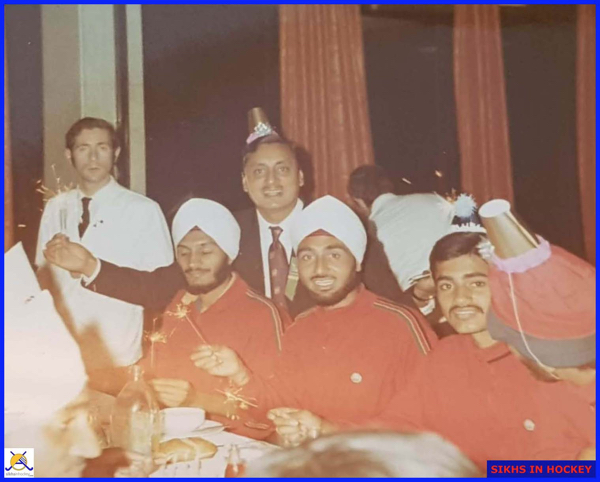
Kenya players celebrating Diwali during the World Cup. Photo: Davinder Singh Deegan
Legacy: After the Barcelona World Cup, where did the player’s hockey careers end up and where are the players today, 50 years on?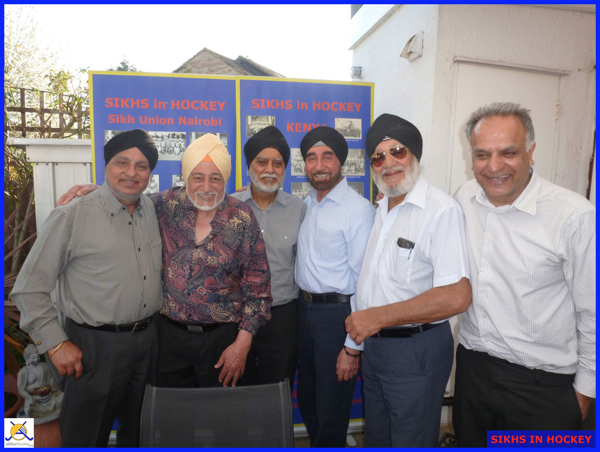
Kenya players from left to right at a reunion in London in April 2018: Amarjeet Marwa; Surjeet Panesar; Surjit Rihal; Harvinder Marwa; Davinder Deegan; Ravinder Laly. Photo: Dil Bahra / Sikhs in Hockey
1. Amarjeet Singh Marwa: after Barcelona World Cup, Amarjeet played at Munich 1972 Olympic Games, his second Olympic Games. He played at Amsterdam 1973 World Cup. He was selected for Montreal 1976 Olympic Games which Kenya, together with other African Nations, boycotted, at the last minute, for political reasons. He emigrated to the UK and resides there.
2. Surjeet Singh Panesar: after the Barcelona World Cup, Surjeet played at Munich 1972 Olympic Games, his fourth Olympic Games. He retired from playing international hockey after Munich Olympics. He died in Nairobi, Kenya on 6 November 2019 aged 81.
3. Avtar Singh Sohal (captain): after the Barcelona World Cup, Avtar captained Kenya at Munich 1972 Olympic Games, his fourth Olympic Games. He retired from playing international hockey after Munich Olympics and took up coaching. He was Kenya’s Coach from 1978 to 1988. He was Kenya’s Coach at Los Angeles 1984 Olympic Games. He also took up Umpiring and was awarded his FIH international Umpires badge in 1980. He was on the FIH Development and Coaching Committee in 1988 and was a Judge at Seoul 1988 Olympic Games. He still resides in Nairobi, Kenya.
4. Santokh Singh Matharu: Santokh retired from playing international hockey after the Barcelona World Cup. He died in Nairobi, Kenya on 21 July 2011 aged 69.
5. Surjit Singh Rihal: after Barcelona World Cup, Surjit played at Munich 1972 Olympic Games. He was Kenya captain from 1973 to 1981 and captained the team at Amsterdam 1973 World Cup. He was selected as captain for the Kenya team for Montreal 1976 Olympic Games which Kenya, together with other African Nations, boycotted, at the last minute, for political reasons. He took up umpiring and coaching after retiring from playing international hockey in 1981. He was Assistant Manager / Coach at Los Angeles Olympic Games. He resides in the U.K.
6. Resham Singh Bains: after Barcelona World Cup, Resham played at Munich 1972 Olympic Games. He retired from playing international hockey after Munich Olympics and took up umpiring. He umpired at the London 1986 World Cup and the Junior World Cup in Kuala Lumpur in 1986. He was a Committee member of the FIH Umpiring committee from 2003 to 2005, Vice Chairman of African Hockey Federation and an executive Board member of National Olympic Committee of Kenya. He was the Chairman of Kenya Hockey Union from 2005 – 2013. He still resides in Nairobi, Kenya.
7. Leo Fernandes: after Barcelona World Cup, Leo went on to represent Kenya at Munich 1972 Olympic Games, his third Olympics. He retired from playing international hockey and emigrated to Canada where he still resides.
8. Jagjit Singh Kular: after the Barcelona World Cup, Jagjit played at Munich 1972 Olympic Games, his second Olympic Games. He played at Amsterdam 1973 World Cup and later that year immigrated to Canada. He died in Toronto, Canada on 12 June 2017 aged 75.
9. Davinder Singh Deegan: after Barcelona World Cup, Davinder played at Munich 1972 Olympic Games, his second Olympic Games. He played at Amsterdam 1973 World Cup. He was selected for Montreal 1976 Olympic Games which Kenya, together with other African Nations, boycotted, at the last minute, for political reasons. He emigrated to the UK in 1979. He resides in the U.K.
10. Ravinder Singh Laly: after the Barcelona World Cup, Ravinder was selected to represent Kenya at Munich 1972 Olympic Games but was dropped from the squad for citizenship reasons days before the squad departed for the Olympics. He immigrated to the UK in 1972 and played club hockey at the highest level, firstly with Havant Hockey Club in Portsmouth and then with Slough Hockey Club, winning the National indoor championship and the European Cup Winners Cup with the Club. He is currently the President of Slough Hockey Club and still plays Masters hockey.
11. Tarlochan Singh Channa: after Barcelona World Cup, Tarochan played at Munich 1972 Olympic Games. He played at Amsterdam 1973 World Cup. He was selected for Montreal 1976 Olympic Games which Kenya, together with other African Nations, boycotted, at the last minute, for political reasons. He still resides in Nairobi, Kenya.
12. Shabir Bhatti: after Barcelona World Cup, Shabir played at Munich 1972 Olympic Games. He played at Amsterdam 1973 World Cup. He was selected for Montreal 1976 Olympic Games which Kenya, together with other African Nations, boycotted, at the last minute, for political reasons. He still resides in Nairobi, Kenya.
13. Jagmel Singh Rooprai: after Barcelona World Cup, Jagmel played at Munich 1972 Olympic Games, his second Olympics. He played at Amsterdam 1973 World Cup. He emigrated to the UK in 2001. He resides in the UK.
14. Harvinder Singh Marwa: after Barcelona World Cup, Harvinder played at Munich 1972 Olympic Games, his second Olympic Games. He was selected for the Amsterdam 1973 World Cup but injury just before the tournament started forced him to drop out. He retired from playing international hockey after that. He emigrated to the UK and resides in the UK.
15. Saggia Hezron: No updates available at time of writing.
16. Brajinder Daved: after Barcelona World Cup, Brajinder played at Munich 1972 Olympic Games. He played at the Amsterdam 1973 World Cup. He was selected for the Kenya team for Montreal 1976 Olympic Games which Kenya, together with other African Nations, boycotted, at the last minute, for political reasons. He played in the 1974 Africa Cup of Nations and was captain at the 1983 Africa Cup of Nations. He was Kenya’s captain at 1984 Los Angeles Olympic Games. He came to study to the UK in 1974 and played club hockey at the highest level with Bedfordshire Eagles and Slough Hockey Club with whom he won the UK National Indoor and Outdoor Championships including The European Cup Winners Cup. He also won numerous county championships with Middlesex County. He resides in the UK.
Sikhs in Hockey
Field Hockey Season Award Winners Lead All-ACC Team
GREENSBORO, N.C. – North Carolina junior Erin Matson has been voted the Atlantic Coast Conference Field Hockey Offensive Player of the Year for the third consecutive season and joins three other major award winners among the 2020-21 honorees announced Thursday.
Boston College goalkeeper Jonna Kennedy was selected as the ACC Defensive Player of the Year in balloting among the league’s seven head coaches. Duke’s Darcy Bourne earned the nod as ACC Freshman of the Year, while North Carolina’s Karen Shelton was chosen the ACC Coach of the Year for the 11th time.
Matson, Kennedy and Bourne were all voted All-ACC first team. Boston College, North Carolina, Syracuse and Wake Forest lead the way with four players each selected to the first or second teams. Each of the ACC’s seven teams had at least two players chosen.
Matson becomes the second field hockey student-athlete to be voted the ACC Offensive Player of the Year three times, and the first since four-time selection Katie O’Donnell of Maryland (2007-10). Matson leads the ACC with 56 points on 24 goals and eight assists, including 11 of UNC’s 15 goals in five spring games (while assisting on another).
The Chadds Ford, Pennsylvania, native delivered three hat tricks during the regular season, including one that included the winning goal in overtime in each of the Tar Heels’ last two games. A six-time ACC Offensive Player of the Week selection and a three-time NFHCA National Player of the Week in 2020-21, Matson ranks second on UNC’s all-time scoring list and eighth all-time among ACC players with 196 career points.
Boston College’s Kennedy was twice named the ACC Defensive Player of the Week this season and was also honored twice as a National Player of the Week by the NFHCA. The Watertown, Massachusetts, junior leads the ACC in saves with 6.75 per game, including an eye-opening 8.83 in six conference games in goal.
Kennedy recorded three shutouts on the season and leads the conference in save percentage (.794). Her 21 saves in the Eagles’ 2-1 double-overtime win over Syracuse on April 10 are the most by an ACC keeper in 2020-21 and rank third on Boston College’s all-time single-game list.
Duke’s Bourne ranks seventh in the ACC in total points (17) and is tied for fourth in goals scored (eight). The Esher, England, native leads the Blue Devils in both of those categories, as well as total shots (46) and shots on goal (22). She is the first Duke player since 2002 to earn ACC Field Hockey Freshman of the Year honors.
Bourne was named the ACC Co-Offensive Player of the Week on March 9 after scoring both goals in the Blue Devils’ 2-0 win at Virginia.
Shelton guided North Carolina to its fourth consecutive ACC Field Hockey Championship title and the 23rd under her watch last fall. The two-time defending NCAA champions finished atop the ACC spring standings with a 5-0 record and finished the regular season with a 15-1 overall record and 14-game winning streak.
This year’s extended season saw Shelton become the winningest coach in NCAA field hockey history, and she currently sports a 707-165-9 mark in her 40 seasons at UNC. She is one of only two coaches in the history of collegiate field hockey to win 700 games.
Each ACC team ended the regular season ranked among the top 15 teams in the NFHCA coaches’ poll, including three among the top 10 in No. 1 North Carolina, No. 3 Louisville and No. 10 Boston College. Syracuse and Wake Forest are tied for the 11th spot nationally, followed by No. 13 Virginia and No. 15 Duke.
Postseason action begins Friday, when North Carolina plays host to Wake Forest in the ACC’s NCAA Automatic Qualifier Game (1 p.m., ACC Network). The winner will receive the ACC’s automatic berth in the upcoming NCAA Division I Field Hockey Championship. This year’s NCAA tournament will feature a 12-team field, consisting of 10 automatic qualifiers and two at-large selections. The complete bracket will be released at 10 p.m. ET Saturday on ncaa.com.
UNC’s Karen Shelton Stadium is also slated to be the host venue for the NCAA semifinals and final on May 7 and May 9.
2020-21 All-ACC Field Hockey
First Team
Margo Carlin, Boston College, F, So.
Jonna Kennedy, Boston College, GK, Jr.
Darcy Bourne, Duke, M, Fr
Eva Nunnink, Duke, D, Gr.
Mercedes Pastor, Louisville, M, Sr.
Erin Matson, North Carolina, F, Jr.
Eva Smolenaars, North Carolina, M, Sr.
Eefke van den Nieuwenhof, Syracuse, B, Fr.
Charlotte DeVries, Syracuse, M, So.
Rachel Robinson, Virginia, D, Sr .
Amber Ezechiels, Virginia, D, Jr.
Meike Lanckohr, Wake Forest, M, So.
Second Team
Fusine Govaert, Boston College, B, Sr.
Elizabeth Warner, Boston College, F, Sr.
Alli Bitting, Louisville, D, Sr.
Charlie van Oirschot, Louisville, M, Fr.
Amanda Hendry, North Carolina, GK, Sr.
Meredith Sholder, North Carolina, F, Jr.
Pleun Lammers, Syracuse, F, Fr.
Laura Graziosi, Syracuse, M, Jr.
Lauren Janssen, Virginia, F, So.
Laia Vancells, Wake Forest, M, Jr.
Nat Friedman, Wake Forest, M, So.
Grace Delmotte, Wake Forest, F, Fr.
ACC Offensive Player of the Year
Erin Matson, North Carolina
ACC Defensive Player of the Year
Jonna Kennedy, Boston College
ACC Freshman of the Year
Darcy Bourne, Duke
ACC Coach of the Year
Karen Shelton, North Carolina
The ACC media release
Weekend College Games: April 22 - 25
Conference tournaments are among us! With three weeks remaining in the 2020v2 college season, more and more teams are either wrapping up their season or competing in their representative conference games. Check out this action packed weekend and week of upcoming college games to follow and watch! (schedule subject to change)
Top-Seeded Field Hockey Advances to BIG EAST Final With 4-0 Win Over No. 4 Temple
UConn Advances to BIG EAST Final for 19th-Straight Time
CONSHOHOCKEN, Pa. – BIG EAST Offensive Player of the Year Sophie Hamilton posted her sixth multi-goal effort this season to lead the No. 1 seeded University of Connecticut field hockey team past fourth-seeded Temple, 4-0, in BIG EAST Tournament semifinal action on Thursday afternoon in Conshohocken, Pa. With the win, the Huskies improve to 10-1 overall this season and will play the winner of this afternoon's Liberty vs. Old Dominion matchup in Saturday's final.
UConn, ranked seventh in the country, has now advanced to the BIG EAST Championship Final every year since 2002 and improves to 47-11 all-time in championship play. UConn has won the last eight BIG EAST Championships.
The Huskies will play for their ninth-straight BIG EAST Championship on Saturday. Game time is set for 12 p.m. and the contest will be broadcast live on the BIG EAST Digital Network, Presented by SOFI.
Although the Huskies had not played a game since defeating Villanova on April 4, Hamilton picked up right where she left off by getting UConn on the board just 5:04 into the contest. Hamilton took a feed from league Co-Freshman of the Year, Claire van den Noort, and found the back of the net to give the Huskies a lead it would not relinquish.
Sophomore Claire Jandewerth gave the Huskies some insurance when she converted on a penalty stroke, sneaking the ball into lower righthand corner and past a diving Cristina Carotenuto.
Hamilton's second goal of the game, and her 17th this season, came at the 42:10 mark when she found the back of the net off a feed from Lindsay Dickinson. Hamilton would then add an assist off of van den Noort's goal just over 12-minutes later.
The Huskies put forth another dominant effort, outshooting Temple by a 12-4 count and holding a 9-0 advantage in penalty corners.
Redshirt junior goalkeeper Cheyenne Sprecher nailed down her ninth shutout in 11 games this season and stopped two shots by the Owls.
UConn Huskies
Rutgers Field Hockey loses to Northwestern 2-1 in B1G Quarters
The disappointing defeat likely ends what was a very successful season for the Scarlet Knights.
By Aaron Breitman:format(webp)/cdn.vox-cdn.com/uploads/chorus_image/image/69168588/Milena.0.jpg)
Rutgers Athletics
No. 8 Rutgers field hockey suffered a 2-1 defeat to No. 5 Northwestern in the Big Ten Quarterfinals on Wednesday night in Iowa City, Iowa. The Scarlet Knights held a 10-6 shot advantage and 7-3 edge in corners, but they weren’t able to capitalize on scoring opportunities.
RU fell behind around five minutes into the game as Lakin Barry scored off of a deflection into the net on a penalty corner. In the second period, Bridy Molyneaux came through with a goal off an assist from Kassidy Shetler that tied the score. It remained that way at the half after Rutgers goalkeeper Gianna Glatz made 4 key saves.
Northwestern regained the lead for good after making a critical save on a RU penalty corner that they quickly turned around in transition. It resulted in Bente Baekers finding herself uncovered near the net and she delivered the decisive goal.
Rutgers had multiple chances to tie the game with a series of three consecutive penalty corners, but they couldn’t convert. After beating Northwestern twice in the regular season, they were unable to do it a third time.
The Scarlet Knights are unlikely to make the NCAA Tournament after this year’s field has been reduced to just 12 teams total and only two at-large selections. Despite a 9-6 record and no. 8 national ranking, the season is seemingly over after losing in the Big Ten Quarterfinals.
The good news is that all four seniors that received All-Big Ten honors, including Gianna Glatz and Katie Larmour as First Team selections as well as Kerrie Burns and Milena Redlingshoefer as Second Team selections, are set to return for next season. Rutgers has made tremendous strides the past three seasons under Co-Big Ten Coach of the Year Meredith Civico and the future looks bright.
On the Banks
Iowa field hockey falls to Michigan in Big Ten Tournament semifinals
The Wolverines defeated the Hawkeyes in shutout fashion, 2-0, to advance to the Big Ten Tournament finals.
Ben Palya, Sports Reporter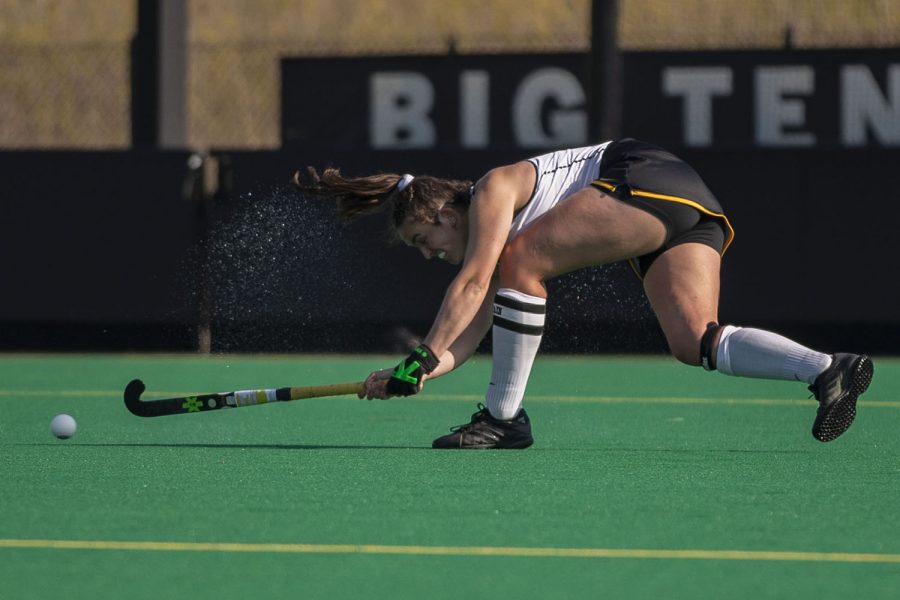
Iowa defender Anthe Nijziel sweeps the ball during the third quarter of the Big Ten field hockey tournament semifinals against No. 1 Michigan on Thursday, April 22, 2021 at Grant Field. The Hawkeyes were defeated by the Wolverines, 0-2. Michigan will go on to play against No. 7 Ohio State in the championships on Saturday. Hannah Kinson
Without its top offensive option — senior forward Maddy Murphy — Iowa field hockey fell to No. 2 Michigan, 2-0, in the Big Ten Tournament semifinals Thursday at Grant Field in Iowa City.
Murphy, who has scored seven times this season and 43 times on her career, sat out Thursday’s game with a non-COVID-19-related illness. Murphy did not make an appearance at Grant Field on Thursday.
Iowa struggled offensively without Murphy. In total, the Hawkeyes took just six shots against the Wolverines — one shy of the season-low five shots Iowa put up against Penn State on Feb. 28.
While Hawkeye head coach Lisa Cellucci did acknowledge that Murphy’s absence was a factor postgame, she didn’t think it was the sole reason Iowa lost Thursday.
“It definitely played a part,” Cellucci said. “She’s our go-to person at the front of the field and is a part of all the set pieces. Not the reason we didn’t get the result. We could’ve found a different way to win, and we didn’t.”
Unlike Iowa, Michigan applied pressure offensively throughout Thursday’s contest. Hawkeye goalkeeper Grace Mcguire had to make two saves in the first period alone.
After a scoreless first period, Michigan broke the game’s tie in the second, as Wolverine midfielder Sofia Southam deflected a long pass into the back of the net to give Michigan a 1-0 lead at the break.
Counting Thursday’s game, the Hawkeyes have not come back from a deficit of any size in 2021.
With just under three minutes remaining in the third quarter, Michigan seemingly punched its ticket to the Big Ten Tournament finals, scoring off a penalty corner to take a 2-0 lead over the Hawkeyes.
In the fourth period, Iowa was rewarded four penalty corners. The Hawkeyes, however, did not cash in on any of those scoring chances.
According to Cellucci, the Wolverines have improved since the Hawkeyes last played them March 14.
“When we played Michigan they had only played one game, so they’ve gotten better,” Cellucci said. “They have an outstanding team and they are peaking at the right time.”
The Hawkeyes’ Big Ten Tournament semifinal game could prove to be their last of the season, as their fate now sits in the hands of the NCAA Division I Women’s Field Hockey Championships selection committee.
Because of COVID-19, the 2021 NCAA Division I Women’s Field Hockey Championships’ field shrunk from its usual 16 teams to 12. With nine conference champions receiving automatic tournament bids, that means just three at-large bids are up for grabs.
Iowa is currently ranked fourth in the National Field Hockey Coaches Association rankings, behind No. 1 North Carolina, No. 2 Michigan, and No. 3 Louisville.
“We’ve been in the top four of the country all season long, but if Michigan wins this tournament, we have a slim chance. If they don’t, we won’t be in,” Cellucci said.
The 2021 NCAA Division I Women’s Field Hockey Championships field will be announced April 24 at 10 p.m.
The Daily Iowan
After loss in the Big Ten tournament, Maryland field hockey’s fate is out of its hands
Shane Connuck
Maryland field hockey won 2-1 over Rutgers on April 17, 2021. (Joe Ryan/The Diamondback)
Maryland field hockey has had an unusual season. The traditional fall sports team just completed a 14-match regular season and played in the Big Ten tournament this week.
Coach Missy Meharg replaced Sue Tyler as the Terps’ head coach for the 1988 season after serving as a graduate assistant for three years. In addition to growing up playing the sport in Pennsylvania and earning All-American honors when competing for Delaware, the fall of 2020 was her first in a long time that didn’t feature a full slate of field hockey.
And Meharg couldn’t be prouder of the 20 women on her roster who’ve gotten through the challenges the last year has brought.
“I can’t believe how resilient, how powerful, how strong these women and this team and this program is,” Meharg said.
No. 9 Maryland’s 3-0 loss to No. 4 Iowa on Wednesday knocked the Terps out of the Big Ten tournament and may have jeopardized their chances of being selected in the 12-team NCAA bracket.
But that loss doesn’t tell the team’s whole story. Not only did Maryland have to deal with the obstacles caused by the COVID-19 pandemic, but it also lost several of its key players this season, including defender Bodil Keus.
But the Terps didn’t let those setbacks affect their game.
After playing at New Hampshire and winning the America East Rookie of the Year award in 2019, Maura Verleg joined the Terps’ defensive corps and penalty corner attack this spring. The Dutch native stepped up tremendously, scoring three goals, including the game-winner against then-No. 2 Iowa on April 2. She helped lead a defensive unit that allowed just 23 goals, sixth-lowest in the conference.
The team drew a Big Ten-high four penalty strokes, and Riley Donnelly buried three of them. Donnelly, a defender, also netted a trio of goals off penalty corners and led her squad in scoring.
“We’ve been faced with so many things this season, COVID being one of the biggest things, but just so many other things within our team,” midfielder Kyler Greenwalt said. “Especially with the numbers that we have, we’ve played some very good games this season.”
Before Maryland entered Iowa City, Iowa, for its showdown with the Hawkeyes in Wednesday’s Big Ten tournament quarterfinals, it rebounded from a three-match skid with a pair of victories over then-No. 6 Rutgers. The Terps seemed to finally find their groove at the conclusion of a tumultuous regular season where it hovered around the .500 mark.
But Iowa had other plans. It scored twice in the first seven minutes, asserting its dominance early.
“What’s disappointing for us is we had been playing several games in a row with really sustained passing,” Meharg said. “When you don’t pass the ball in the front space, then your eyes have to go to your back space.”
So, the Terps made that adjustment. And they didn’t allow the Hawkeyes to score a single goal in the second half.
But it was too little, too late for Meharg’s squad. Iowa’s three-spot in the first half carried it to victory, and the Terps fell, landing 8-7 on the season.
“We’ve had a good season, highs and lows,” Meharg said. “I applaud Iowa for a dominant performance.”
The Diamondback
FIH publishes Congress agenda
Lausanne, Switzerland: The agenda of the FIH Congress, which will be held virtually on 22 May, is now published. The upcoming meeting of the supreme organ of hockey’s world governing body includes, amongst others, elections for the position of FIH President and for four positions of EB Ordinary Member.
Elections will be conducted via e-voting (art. 6.3 c) FIH Statutes) and overseen by the FIH Elections Oversight Panel (EOP), as stipulated in the FIH Elections Manual (art. 11). UK company Lumi will operate the e-voting process. Furthermore, FIH has appointed an independent notary (from UK firm Cheeswrights Scrivener Notaries LLP), who will chair and oversee the election process. His powers are delegated by the Elections Oversight Panel.
Other points on the agenda include:
- A vote on the admission of the following nations as new FIH Members:Gambia, Saudi Arabia and Timor Leste (all approved as provisional Members by the FIH Executive Board on 22 October 2020);
- A vote on the admission as FIH Member of a new National Association (NA) in Indonesia, which is recognised by the Indonesian NOC. This is due to the non-fulfilment of their obligations by the current NA. It requires however that the Congress first expels the current NA;
- A decision to approve the use of gender-neutral terms in the FIH Statutes;
- A decision to extend FIH’s purpose and powers within its Statutes to any virtual or e-gaming activities and competitions for the future
As specified in the FIH Statutes (article 2.2(a)(ii)), newly approved Members present at Congress will have the right to participate in meetings of Congress and to cast a vote on resolutions put to Congress.
On the eve of the Congress, all delegates have been invited to join a #HockeyInvites virtual conference organised by FIH where a number of topics, such as development, sport matters, gender-equality, promotion or integrity, will be discussed.
For more information about FIH and hockey in general, please download the Watch.Hockey app or follow the FIH social media channels - Facebook, Instagram and Twitter – and website.
FIH
